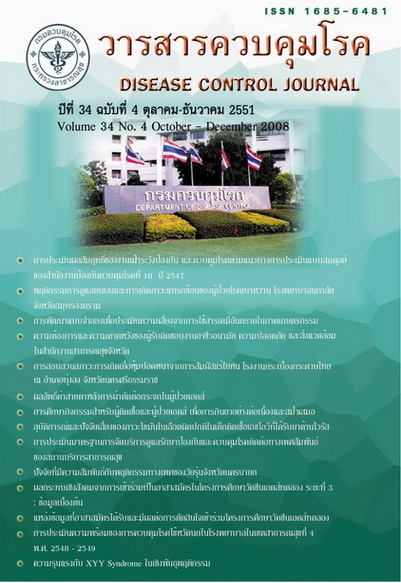CD4 Monitoring in HIV Infected Patients not Eligible for Receiving ARV in 2004 - 2006
Keywords:
CD4 cell monitoring, Asymptomatic patients, Median survival time before stating ARV, Health promotion in HV infected patientAbstract
The objectives of this study was to encourage for continuously periodic CD4 count in asymptomatic patients. HIV infected patients who had been treated in 30 hospitals in Chiang Mai, Chiang Rai and Phayao whose CD4 count > 200 and had no symptom according to 506/1 report were recruited for the study. Classifying for CD4 count tests were as follows: every 6 month for patients with CD4 > 300, every 4 months for those with CD4 = 251 - 300 and every 2 months for those with CD4 = 200 - 250 cell/mm3. CD4 level monitoring and related variables such as patient's characteristic, basic health care information, sexual behaviors, opportunistic infections and other risk factors were collected for 2 years time. It was found that there were 2,140 HIV infected patients recruited in this study of which 1,525 cases were group A (CD4 > 300 cell/mm3 ); 319 cases were group B (250 < CD4 < 300 cell/mm3) and 296 cases were group C (200 < CD4 < 250 cell/mm3). About 63.6 % were female; the incident of opportunistic infections (OI) were 0.8/100PY and median survival time before starting ARV in was 14, 7 and 2 for the Group A, B and C respectively. Group A is significantly different from others (P < 0.05) but group B and C is not .(P = 0.85). Median CD4 of all samples who started ARV drug was 175.3 cell/mm3. 38.5% of HIV/AIDS patients participated as a member in Day Care Center and 51.0 % of HIV/AIDS patients who have sex with partner used condom every times. The advantages of CD4 monitoring project contain to increase CD4 level at starting ARV in HIV infected patients in order to reduce side effects of ARV using, and enhance the achievement of HIV treatment due to increasingly and easily access CD4 monitoring service. Including, HIV infected patients were educated and received treatment and care continuously to reduce risk factors.
Downloads
References
2 Hunt PeterW, Deeks StevenG,Rodriguez, Bening noC, ValdeZ Hernan C , Shade Starley B , etal. Continued CD4 cell countincreases in HIV infected adults experiencing 4 years of viral suppression on antiretroviral therapy. AIDS 2003;
17(13) : 1907-1915
3. Kaufmann Gillbert R, Block Mark, Finlayson Robert , Zaunders John, Smith Don, Cooper David A. The extent of HIV-1-relatted immunodeficiency and age predict the long term CD4T lymphocyte response to Potent antiretroviral therapy. AIDS 2002; 16 (3): 359-367
4. Hans H. Hirsch, Gilbert Kaufmann, Pedram Sendi, Manual Battergay. Immune Reconstitution in HIV-Infected Patients. Clinical Infectious Diseases 2004; 38: 1159-1166
5. Panita Pathip vanich MD, Archawin Rojana wiwat MD, Koya Ariyoshi MD, Toshiyuki Miura MD, Wadchara Pumpradit MD, Suchint Wong choosie MD et al . Mortality Analysis of HIV-1 Infected Patients for Prigritizins Antiretroviral Drug Therapy. J Med Sssoc Thai 2004; 8: 951-4
6. Wood, Evan; Hogg, Robert S, Yip, Benita, Harrigan , P Rochard, O' Shaughnessy , Michael V Montaner, Julio SG. Is there a baseline CD4 cell count that precludes a survival response to modern antiretrpviral therpy. AIDS. 2003: 17(5): 711-720
7. Gilbert R Kaufmann, Nina Khanna, Rainer Weber, Luc perrin, Hansjakob Furrer, Matthias Cavassini. Long-term response to multiple Sequential regimens of highly active antiretroviral therapy for HIV infection . Antiretroviral therapy 2004; 9: 263 - 274
8. สัญชัย ชาสมบัติ, ชีวนันท์ เลิศพิริยสุวัฒน์, พรทิพย์ ยุคตานนท์. สำนักโรคเอดส์ วัณโรคและโรคติดต่อทางเพศสัมพันธ์ กรมควบคุมโรค. การรักษาโรคติดเชื้อ HIV/AIDS ในผู้ใหญ่: แนวทางการดูแลรักษาผู้ติดเชื้อเอชไอวีและผู้ป่วยโรคเอดส์เด็กและผู้ใหญ่ในประเทศไทย ปี พศ.2547. พิมพ์ครั้งที่ 1. กรุงเทพฯ; 2546: 89-180
9. Mustafa T, SY FS, Macera CA, et al. Association between exercise and HIV disease progression in a cohort of homosexual men. Ann Epidemiol. 1999: 9(2): 127-31
10. Vongsivalas Y, Yenrudi S. Lung cancer in AIDS/HIV infection. Chula Med J 2004
11. Holistic services and community involvement: the combined Chiang Rai day care center strategies. R Lolekha. Presented at the 7th ICAAP. Japan.
12. ธีรพล สุขมาก, อารีย์ สุภาวงศ์, เพียงใจ ตัณฑชน, ศุภลักษณ์ จิตนาธรรม. ประสิทธิภาพและผลข้างเคียงของการใช้ยาต้านไวรัสเอ็ชไอวีที่ โรงพยาบาลทุ่งสง. วารสารโรคเอดส์. 2548; 17: 60-72
13. Virus disease AIDS and Related disorders : in: Dennist L Kasper, Eugene Braunwald, Anthony S fauci, Stephan L. HAUSER, Dan L.Longo, J. Larry jameson. Harrison s principles of internal medicine. 16 thed. New York: Mc Graw Hill; 2005. 1076-1139
Downloads
Published
How to Cite
Issue
Section
License
Articles published in the Disease Control Journal are considered as academic work, research or analysis of the personal opinion of the authors, not the opinion of the Thailand Department of Disease Control or editorial team. The authors must be responsible for their articles.






